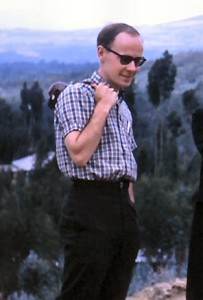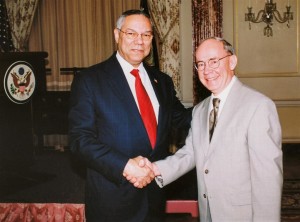Neil Boyer's (Ethiopia 1962-64) Christmas Letter Home
What parents, siblings, and friends loved most about our Peace Corps experience were our letters home. Of course, today, there is little need for such letters, given cell phones and the Internet, but in the first years of the agency, letters home (and received) were treasured by all of us.
Recently Neil Boyer (Ethiopia 1962-64) sent me an email about his first Christmas letter home. Neil wrote: “My cousin Barbara Duhamel recently supplied me with some of her archives, and they included the holiday letter that I sent from Addis Ababa, Ethiopia, in December 1962 — the first of many letters. From the distance of 52 years, some of the contents of this letter seem a little exaggerated and perhaps overly optimistic, but it’s pretty clear I was enjoying my introduction to the Peace Corps.”
I asked Neil if I might reproduce the letter for others to share and enjoy. Those RPCVs from the early years might remember fondly the thin aero grams that took a week or more to cross the Atlantic, and all RPCVs can recall the feelings of what it was like when we were ‘somewhere else’ on our first Christmas in the Peace Corps. Thank you Neil for sharing your letter and Marian Haley Beil (Ethiopia 1962-64) and I would also like to wish everyone Happy Holidays with the wish and hope 2015 will be the best year ever for all of you and, of course, our Peace Corps.
John Coyne (Ethiopia 1962-64)
Neil Boyer’s Christmas Letter
December 1962
Addis Ababa, Ethiopia
Merry Christmas
I hope you don’t mind getting a letter in this form, but it was the only way I could find to tell a lot of things to a number of people at one time. As you probably know, the Peace Corps is what has brought me to Ethiopia and will keep me here for another year and a half. I’m one of a group of 275 volunteers in this country – the largest (and most unwieldy gang the agency has ever sent out).

Neil in '62
Most of us are teachers in the secondary schools of the Empire (two are doctors and a few are helping the administrators in the Ministry of Education). There’s also the possibility that the three law school graduates in the group (myself included) will begin work soon with either the local advisor to the Prime Minister or with the Ministry of Justice (details of everything are worked out very slowly).
I’m stationed in Addis Ababa, the capital city, with 55 other PCV’s- the largest concentration in the country. We’re scattered throughout 12 schools in the city. I’m at the Commercial School, a rather modern and efficiently-run school whose object is to produce office workers and apprentice administrators with capability in English as well as commercial subjects. It is one of the country’s best schools, and it had to refuse about 700 eighth-grade graduates who requested admission last fall. I’m teaching 27 periods a week of second-year English. That’s two classes. The second-year students now get 11 periods of English a week in an effort to increase their value to business offices.
English is the second language of the country (Amharic, a Semitic language with elements of Arabic and Greek, is the primary language of many of the students, although many first learned a local or tribal language). All instruction in the schools above the sixth grade is done in English. This makes it relatively easy to teach, and the PCV’s have had little trouble being understood in class. The classes in the schools of the city are almost on a level with U.S. high schools.
Many simplified versions of classics are available, as well as many textbooks. But in the provincial schools, PCVs have sometimes found no books at all, or very few, and they have had to do much improvising. The British and American books in use are also frequently unsatisfactory, and some of the Peace Corps people are planning to put together texts of their own next summer. There’s a lot of activity in the extra-curricular field as well, and I’m working at the Commercial School as advisor to the school newspaper. I’m also giving lessons on brass instruments to a small group of boys who are having trouble forgetting the Ethiopian five-tone scale. There are four PCVs at the Commercial School, three male English teachers and one woman who teaches shorthand and typing. We have organized several clubs, one of which is the school’s first “glee club” (and the British teachers despise the name). In one provincial community, a PCV who was formerly a fire chief in a small New Hampshire town is trying to organize a volunteer fire department.
The people here are probably the friendliest in the world. I shake more hands in a day than I did in a month in the U.S. The students even shake hands with each other every day when they arrive at school.
The weather has been great ever since we arrived, except for the first three weeks. That was the end of the rainy season (predictable rain every afternoon, unpredictable other times), and since then it’s only rained for two days. We’re between 6,000 and 8,000 feet above sea level, and it gets quite chilly at night, probably about 45 or 50 degrees. In the daytime it’s rather hot but never above 80, never any sweating – really ideal almost every day, all day. The only problem we’ve had is with the altitude – our lungs still don’t allow us to exert ourselves very much.
Living conditions in Addis are quite good, but some of the people in the provinces have it rather rough.

On the road with housemates (l) Charlotte Crawford, Frank Grossmann, Nancy Guillet
I’m Iiving with four others (2 guys, 2 girls — wait until Senator Symington hears about that) in a house that was built as an officers’ club for the Italian army – all rooms opening off a long porch. The cost of living is rather low compared with the U.S. and labor is really cheap. Consequently we have a full-time cook and two students who come in afternoons and Saturdays to do our wash and cleaning. Of course, that wasn’t what we expected, and it was hard getting used to, but now we couldn’t get along without them.
The Peace Corps has supplied us with furniture, refrigerators, stoves (not yet arrived, but we’re borrowing one) and books – a footlocker full, ranging from Dr. Spock and Art Linkletter to Richard Nixon, Edward Gibbon and William Shakespeare (maybe Nixon should be on the other side of that sentence). The people in the province towns get vehicles (Jeepsters or Landrovers) so they can get supplies and meet medical emergencies, but there’s no such problem in Addis. As a result, we’ve been given bicycles, which aren’t of much value on these hills, and an extra $25 (Ethiopian money) for transportation in town. Twenty five cents (ten cents U.S.) will get you a ride anywhere in town in a tiny Fiat, provided it isn’t raining or nighttime or grouch time for the driver. The small amount of Amharic we’ve picked up (some have done better than others) has been useful in haggling with the taxi drivers, as well as in the bargaining that must be done for almost everything we buy in the market.
The schools run on a three-term year, the first ending in December, followed by a long Christmas vacation, Christmas falling on January 7 for a reason we’ve not yet figured out (the year here is 1955, for a reason just as obscure). Current plans are to fly all the PCVs to Asmara during the vacation for a type of reunion and a conference on future plans. They want to give us a chance to swap teacher tricks, since very few of the group had ever taught school before they came here, as well as to plan outside projects. One plan is the placement of street signs along the Addis Ababa roads – the lack of which has made confusion unlimited for sign-conscious Americans. [Editor’s note: it turns out there were signs, but not in our language!]
I guess that in a way summarizes my activities since September 6 (when we arrived here via Ethiopian Air Lines DC-6 – we’ll be leaving here by new Boeing 720B jet). Here’s wishing a Merry Christmas to everyone, as well as a Happy New Year, both 1963 and 1956.
Tenastelign,’Melkam ye Lidet b’a al ena melkam adis amet’
Neil
Neil graduated from Moravian College and New York University School of Law before joining the Peace Corps in 1962. He taught for a year at the famous Commercial School in Addis Ababa, Ethiopia, and then transferred to Haile Selassie University where he prepared memos on the Ethiopian court system for the arriving faculty at the new law school, and taught English at the new Business College at the University. Returning home, he worked for the Peace Corps for several years before moving onto the Department of State, where he became the director of the “reverse peace corps,” called Volunteers to America. Later he represented the Department of State at meetings of the World Health Organization and the Universal Postal Union. Today he is retired and lives in Silver Spring, Maryland.

Retirement Ceremony with Secretary of State Colin Powell
Such a Christmas story from my first Americans, such positive feelings towards my people, my culture and my country was the lure, the magic and the spell that enchanted me to leave home, family and friends behind and to come to the new world and make it my home. Thank you John Coyne, thank you Neil Boyer and thanks and Merry Christmas to all the PCVs. You made a difference! You are the real gift of this season.
This is a great story, thanks for putting it together, and this site too, John, you are a force of nature! One of these days I’ll read your fiction, I’ll bet it’s equally impressive. Merry Christmas to you and yours!